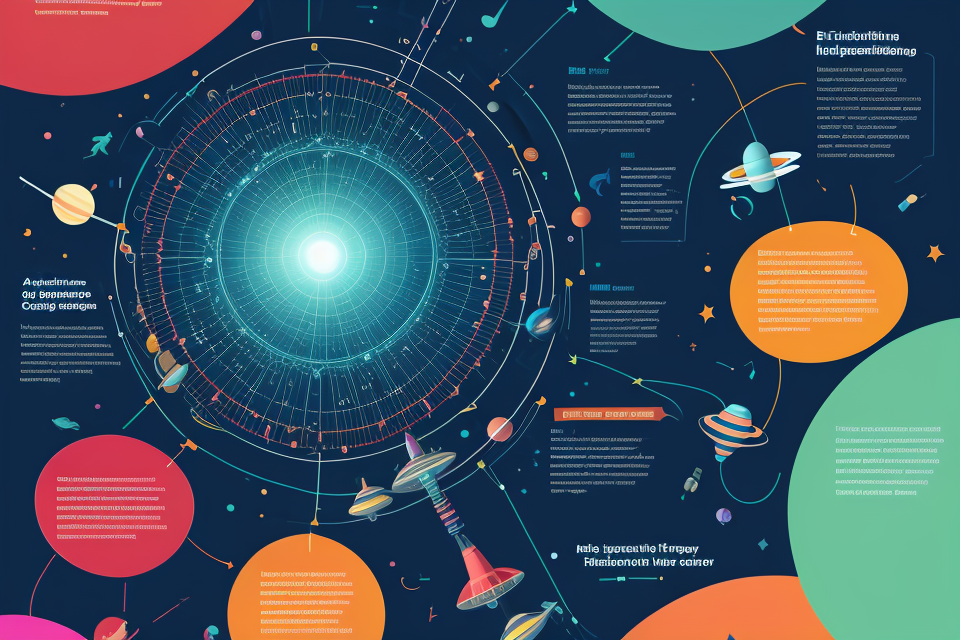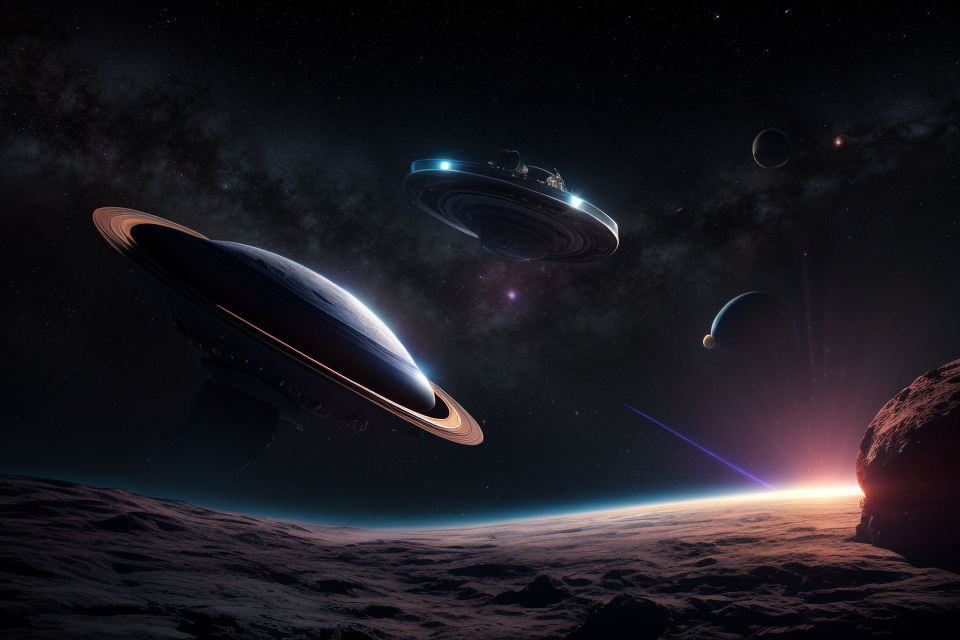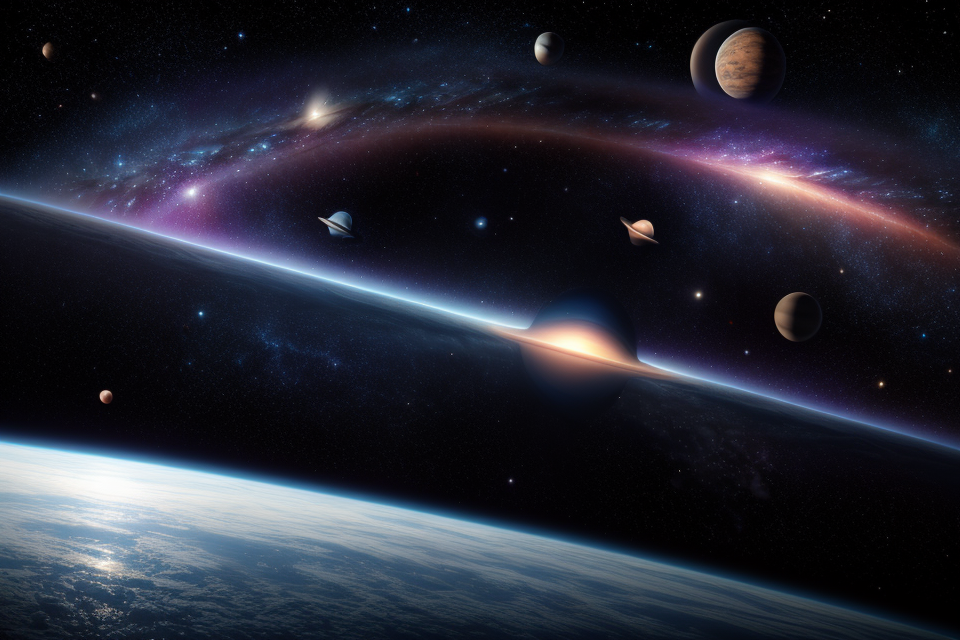The journey to becoming an astrobiologist is a fascinating and exciting one, full of discovery and wonder. It’s a career path that requires a deep passion for science, particularly in the fields of biology, chemistry, and physics. But how long does it take to become an astrobiologist? And what are the requirements to get there? In this article, we’ll explore the timeframes and necessary steps to embark on this thrilling career journey. So, buckle up and get ready to blast off into the world of astrobiology!
How to Become an Astrobiologist: An Overview
Education and Training Requirements
Becoming an astrobiologist requires a combination of education and training in various fields, including biology, chemistry, physics, and astronomy. To pursue a career in astrobiology, individuals typically need to complete a bachelor’s degree in a relevant field, followed by a master’s degree or Ph.D. in astrobiology or a related discipline. Additionally, gaining research experience and publishing scientific papers can also be crucial for establishing a successful career in astrobiology.
Bachelor’s Degree in a Relevant Field
A bachelor’s degree in a relevant field is the first step towards becoming an astrobiologist. Students should choose a degree program that aligns with their interests and career goals, such as biology, chemistry, physics, or astronomy. During their undergraduate studies, students should focus on building a strong foundation in science, including coursework in biology, chemistry, physics, and mathematics.
Master’s Degree or Ph.D. in Astrobiology or a Related Discipline
After completing a bachelor’s degree, individuals interested in pursuing a career in astrobiology should consider obtaining a master’s degree or Ph.D. in astrobiology or a related discipline, such as planetary science, biogeochemistry, or biochemistry. Graduate programs in astrobiology typically involve coursework in astrobiology, biology, chemistry, physics, and related disciplines, as well as research experience and the opportunity to publish scientific papers.
Research Experience and Publications
Gaining research experience and publishing scientific papers is essential for establishing a successful career in astrobiology. Individuals interested in pursuing a career in astrobiology should seek out research opportunities during their undergraduate and graduate studies, such as internships, research assistantships, or fellowships. Additionally, presenting research findings at conferences and publishing scientific papers can help individuals build a strong professional network and establish themselves as experts in their field.
Key Skills and Knowledge Areas
- Understanding of biology, chemistry, and physics
- A strong foundation in biology, chemistry, and physics is essential for astrobiologists. This includes knowledge of cellular biology, genetics, biochemistry, thermodynamics, and other related fields.
- Knowledge of astronomy and planetary science
- Astrobiologists must have a solid understanding of astronomy and planetary science, including the study of stars, galaxies, planets, and other celestial bodies. This includes knowledge of the solar system, planetary formation, and the dynamics of celestial bodies.
- Familiarity with experimental design and data analysis
- Astrobiologists must be able to design experiments and analyze data to test hypotheses and gather evidence. This includes knowledge of experimental techniques, data analysis methods, and statistical analysis.
- Understanding of planetary habitability and the search for extraterrestrial life
- Astrobiologists must have a deep understanding of planetary habitability, the search for extraterrestrial life, and the factors that influence the ability of a planet or moon to support life. This includes knowledge of the environmental conditions that are necessary for life, the search for biosignatures, and the potential for life on other planets or moons.
Timeframes for Becoming an Astrobiologist
Undergraduate Education
- The undergraduate education phase typically spans a duration of four years, during which students pursue a bachelor’s degree in a relevant field such as biology, chemistry, physics, or astronomy.
- This stage serves as the foundation for building a strong academic background in the scientific disciplines that are essential for astrobiology research.
- The key courses that students should focus on during their undergraduate studies include:
- Biology: A strong understanding of biological concepts is crucial for comprehending the origin, evolution, and distribution of life in the universe. Students should delve into topics such as molecular biology, genetics, biochemistry, and cell biology.
- Chemistry: Chemistry is central to many aspects of astrobiology, including the study of the chemistry of life, the search for life on other planets, and the exploration of the chemistry of planetary atmospheres. Courses in organic chemistry, biochemistry, and analytical chemistry are particularly relevant.
- Physics: Astrobiology is an interdisciplinary field that draws heavily from astrophysics, which is the study of the physical universe beyond Earth. Courses in physics, such as astronomy, cosmology, and thermodynamics, provide a strong foundation for understanding the universe and its potential for supporting life.
- Astronomy: As a subfield of astrophysics, astronomy deals with the study of celestial objects and phenomena. Students interested in astrobiology should focus on courses that cover topics such as stellar astrophysics, planetary science, and the formation and evolution of the solar system.
During the undergraduate phase, students are encouraged to engage in research opportunities, such as internships or participating in research projects, to gain hands-on experience in the field of astrobiology. These experiences can help students build their resumes and gain valuable skills that will be useful in pursuing advanced degrees or securing employment in the field.
Graduate Education
Graduate education is a crucial aspect of becoming an astrobiologist. A master’s degree typically takes 2 years to complete, while a Ph.D. usually takes 5-7 years. The courses offered during graduate education are tailored to provide students with a strong foundation in astrobiology and related fields.
Some of the important courses that an astrobiologist should consider taking during their graduate education include:
- Astrobiology: This course provides an overview of the field of astrobiology, including its history, key concepts, and current research. Students will learn about the search for extraterrestrial life, the potential habitability of other planets, and the origins of life on Earth.
- Planetary Science: This course covers the science of planets and their moons, including their composition, structure, and evolution. Students will learn about the physical and chemical processes that shape planetary bodies and the impact of these processes on the potential for life.
- Experimental Design: This course teaches students how to design and conduct experiments to test hypotheses and gather data. Students will learn about experimental techniques, data analysis, and how to control variables to ensure accurate results.
- Data Analysis: This course focuses on the statistical analysis of data, including data collection, manipulation, and interpretation. Students will learn about different statistical methods and how to apply them to astrobiological research.
In addition to these courses, astrobiologists should also consider taking courses in related fields such as biology, chemistry, physics, and geology. These disciplines provide a strong foundation in the sciences and are essential for understanding the complex processes that govern the universe and the potential for life.
Research Experience
- Gain research experience through internships, fellowships, or working as a research assistant
- Important to develop a strong research portfolio
Gaining research experience is a crucial step in becoming an astrobiologist. This can be achieved through various means, such as internships, fellowships, or working as a research assistant. These opportunities allow aspiring astrobiologists to gain hands-on experience in the field and to develop a strong research portfolio.
Internships, in particular, can be an excellent way to gain experience and make connections in the field. Many universities and research institutions offer internships for students interested in astrobiology. These internships provide students with the opportunity to work alongside experienced researchers and to gain practical experience in laboratory and field settings.
Fellowships, on the other hand, are typically more advanced research opportunities that are geared towards graduate students or postdoctoral researchers. These programs provide funding for research projects and often involve collaborations with other institutions or research groups.
Working as a research assistant is another way to gain research experience. This involves assisting a principal investigator with their research projects, which can involve anything from data collection and analysis to laboratory experiments and fieldwork. Research assistants may also have the opportunity to contribute to scientific publications and present their findings at conferences.
Overall, gaining research experience is an essential step in becoming an astrobiologist. It allows individuals to develop a strong research portfolio, which can be crucial when applying for jobs or grants in the field.
Job Market
Competitive Job Market for Astrobiologists
The field of astrobiology is relatively small and highly specialized, leading to a competitive job market for those seeking employment in the field. This means that it can be challenging for aspiring astrobiologists to find employment opportunities, particularly in academia or government research institutions. As a result, it is important for individuals interested in pursuing a career in astrobiology to develop a strong network of professional relationships and stay up-to-date on the latest developments in the field.
Importance of Networking and Building Professional Relationships
Networking and building professional relationships are essential for individuals seeking employment in the competitive field of astrobiology. Attending conferences and workshops, participating in research projects, and collaborating with other professionals in the field can help aspiring astrobiologists build a strong network of contacts and gain valuable experience. Additionally, many job opportunities in astrobiology are not publicly advertised, and instead are filled through personal connections and recommendations. Therefore, it is important for individuals interested in pursuing a career in astrobiology to actively seek out opportunities to network and build professional relationships in the field.
Alternative Careers in Astrobiology-Related Fields
Other Science Disciplines
While pursuing a career in astrobiology, there are several other science disciplines that one can explore. These disciplines may not be directly related to astrobiology, but they can provide valuable skills and knowledge that can be applied to the field. Some of these disciplines include:
Geology
Geology is the study of the Earth’s physical structure and processes. It encompasses a wide range of topics, including the study of rocks, minerals, and landforms. Astrobiologists can benefit from a background in geology as it can provide insight into the Earth’s history and the evolution of life. Understanding the Earth’s geological processes can also help in the search for habitable environments on other planets.
Environmental Science
Environmental science is the study of the interactions between living organisms and their environment. It encompasses a wide range of topics, including air and water quality, climate change, and pollution. Astrobiologists can benefit from a background in environmental science as it can provide insight into the impact of human activities on the environment and the search for habitable environments on other planets.
Microbiology
Microbiology is the study of microorganisms, including bacteria, viruses, and fungi. Astrobiologists can benefit from a background in microbiology as it can provide insight into the origins of life and the search for extraterrestrial life. Understanding the physiology and metabolism of microorganisms can also help in the search for habitable environments on other planets.
Overall, while astrobiology is a multidisciplinary field, other science disciplines such as geology, environmental science, and microbiology can provide valuable skills and knowledge that can be applied to the field.
Other Jobs in Astronomy and Space Exploration
Space Scientist
A space scientist is a professional who studies the various aspects of space, including its composition, dynamics, and interactions with other celestial bodies. These scientists often specialize in fields such as planetary science, astrophysics, or space engineering. Their work can involve analyzing data from space missions, designing experiments for future missions, or developing new technologies for space exploration.
Planetary Scientist
A planetary scientist is a specialist in the study of planets, moons, and other celestial bodies in our solar system. They use a combination of experimental, observational, and theoretical methods to investigate the composition, structure, and evolution of these objects. Planetary scientists often work on interdisciplinary teams, collaborating with other scientists in fields such as geology, astronomy, and physics.
Astronomer
An astronomer is a scientist who studies the universe beyond Earth, including stars, galaxies, and other celestial objects. They use telescopes, spacecraft, and other instruments to gather data about the universe and develop theories to explain the phenomena they observe. Astronomers can specialize in various areas of study, such as stellar astrophysics, galactic evolution, or the search for extraterrestrial life.
Space Mission Specialist
A space mission specialist is a professional who works on the planning, execution, and analysis of space missions. They may be responsible for developing mission plans, selecting mission objectives, and designing spacecraft and instruments. During a mission, space mission specialists may work on the ground or in space, monitoring the progress of the mission and making real-time decisions as needed.
Industry and Government Positions
For those interested in pursuing a career in astrobiology, there are various alternative career paths in industry and government positions. These positions offer opportunities to work in the field of astrobiology, even if becoming an astrobiologist is not feasible or desired. Some of these positions include:
- Biotechnology: Biotechnology companies may offer positions related to astrobiology, such as developing technologies for space exploration or studying extremophiles.
- Environmental consulting: Environmental consulting firms may work with companies and organizations to ensure that their operations are environmentally responsible. Some of these firms may specialize in areas such as astrobiology and environmental monitoring.
- Government research institutions: Government research institutions such as NASA and the European Space Agency (ESA) employ scientists and researchers in various fields, including astrobiology. These institutions offer opportunities to work on cutting-edge research projects related to space exploration and the search for extraterrestrial life.
FAQs
1. What is astrobiology?
Astrobiology is the study of the origin, evolution, distribution, and future of life in the universe. It combines fields such as biology, geology, chemistry, and physics to investigate the possibility of life on other planets and moons, as well as the conditions that could support life in space.
2. What does an astrobiologist do?
An astrobiologist studies the potential for life in the universe by conducting research on the origin and evolution of life on Earth, searching for signs of life on other planets and moons, and investigating the conditions that could support life in space. They may also study the effects of space travel on living organisms and develop strategies for protecting life in space.
3. How long does it take to become an astrobiologist?
Becoming an astrobiologist typically requires a minimum of a bachelor’s degree in a relevant field such as biology, chemistry, or geology, which typically takes four years to complete. However, many astrobiologists have advanced degrees, such as a master’s or PhD, which can take an additional two to four years to complete. The time it takes to become an astrobiologist can vary depending on the individual’s level of education and career goals.
4. What are the requirements to become an astrobiologist?
To become an astrobiologist, you typically need a strong background in science, including biology, chemistry, and physics. Many astrobiologists also have degrees in related fields such as geology or astronomy. In addition to formal education, astrobiologists often have experience working in research laboratories or conducting fieldwork. Some astrobiologists may also have experience in space-related fields, such as aerospace engineering or space technology.
5. What skills are necessary to become an astrobiologist?
Astrobiologists need a strong foundation in science, including biology, chemistry, and physics. They also need excellent research and analytical skills, as well as the ability to work independently and as part of a team. Communication skills are also important, as astrobiologists often need to communicate their findings to other scientists and the general public. Additionally, astrobiologists should be curious and motivated by the prospect of exploring the unknown.



